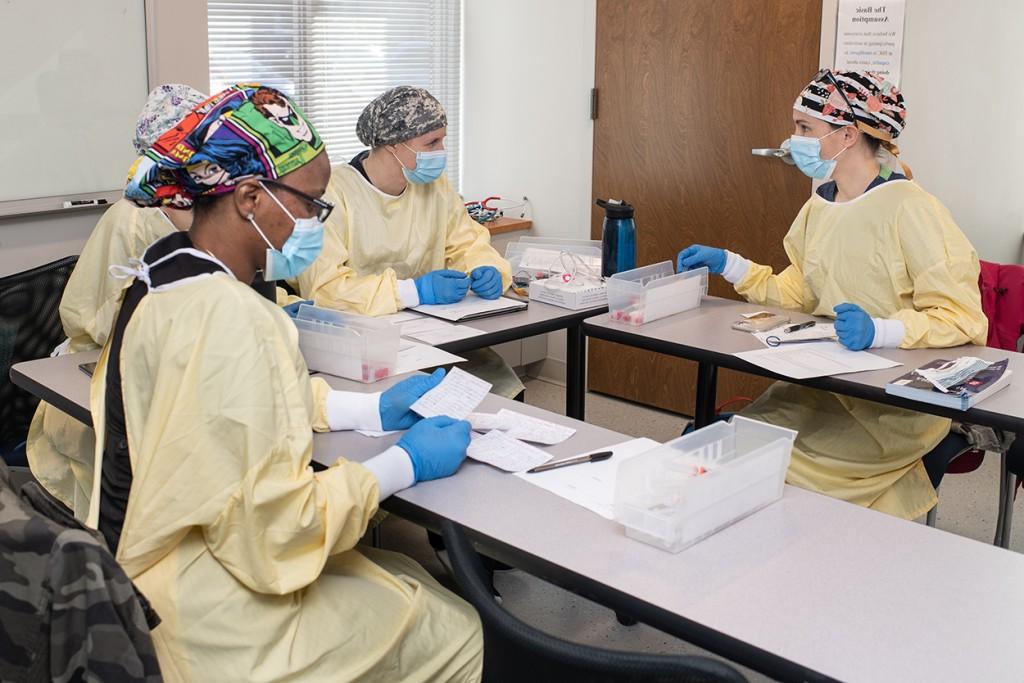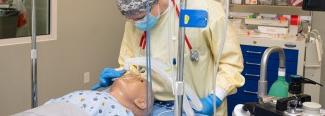Earn Your Doctor of Nursing Practice in Nurse Anesthesia at Maine’s Leading Health University
UNE’s Doctor of Nursing Practice in Nurse Anesthesia program, located in Portland, Maine, produces highly-skilled, well-rounded D.N.P.s with extensive experience in every category of medical procedure in which anesthesia is called for. You will have access to hands-on training, first in our high-tech simulation center and then through extensive clinical training in rural settings, at CRNA-only sites, and in all of the surgical specialties, including neurosurgery, open-heart surgery, and obstetrics. In addition to mastering medical procedures related to anesthesia, you will graduate with research experience as well as vast knowledge of health care systems, special patient populations, and health care policy — all of which equip you to pursue a range of professional avenues, including clinical practitioner, business owner, independent contractor, chief nurse anesthetist, researcher, educator, or an executive-level administrator.

Why UNE for your Nurse Anesthesia Degree
- Where you get your training matters. At 94% and 95% in 2019 and 2020, respectively, our M.S.N.A. degree program graduates’ first-time NCE pass rates were 10 percentage points above the national average. Learn more about the exam and UNE pass rates.
- You benefit by attending a comprehensive health sciences university that is nationally recognized for excellence in preparing students for collaborative, interprofessional, team-based care. Reap the rewards of training alongside future physicians, nurses, physician assistants, pharmacists, dentists, and other health professionals.
- Our interactive, state-of-the-art classrooms offer the latest media and medical instruction technology to our D.N.P program candidates, while our Interprofessional Simulation and Innovation Center is equipped with several high fidelity patient simulators with which you will practice your skills and build confidence in the work that you will perform in your profession.
- From our caring and communicative faculty members who are willing to go the extra mile for you to our skilled tutors in the Student Academic Success Center and our mentoring program that pairs incoming D.N.P. degree candidates with advanced nurse anesthesia students, you can be assured that you will be in a supportive environment with people who value you as a person as well as your professional success. With our low attrition rate and our high first-time NCE pass rate, the proof that we care about our students is in the numbers.
of our students pass the NCE on the first try
Percentage POINTS OUR GRADUATES EXCEEDED THE NATIONAL AVERAGE NCE first-time pass rates by
EMPLOYMENT RATE within 6 months of graduation
Approximate number of hospitals and facilities in New England with CLINICAL TRAINING SITES
What Will you Study? Nurse Anesthesia Curriculum Overview
UNE’s Portland, Maine-based D.N.P. in Nurse Anesthesia degree program operates on a 36-month, full-time calendar, beginning each September with a new entering class. For the first two semesters, you may continue your employment, as you will take online classes, coming to campus for long weekends just once or twice per semester. You will then transition to being on campus full-time beginning with the first summer session after you matriculate. After two semesters of on-campus didactic courses, you will, in the fifth semester, proceed to the clinically-based portion of the program, comprising five semesters that emphasize advanced coursework, simulation lab experiences, clinical training within our 38 partner hospitals throughout Northern New England, and completion of a scholarly research project. Through a breadth of clinical experiences and participation in more than 600 anesthesia cases, you will achieve clinical competency and will be eligible to take the National Certification Exam.
Clinical Experience for the Nurse Anesthesia Degree
Upon completion of the campus-based portion of the program in April, you begin the 19-month hospital-based phase. Your clinical anesthesia training provides a breadth of experiences necessary to achieve clinical competency in anesthesia.
You participate in more than 600 anesthesia cases through our affiliations with sites throughout New England, satisfying the standards set by The Council on Accreditation of Nurse Anesthesia Educational Programs in order to qualify for the National Certifying Examination.
You obtain experience in general anesthetics, intravenous agents, and regional anesthetics—including spinal, epidural, Axillary blocks, and Bier blocks. All of the surgical specialties are available to you, including hands-on training in neurosurgery, open-heart surgery, high-risk obstetrics, and so on.


Career Path for Nurse Anesthesia Grads
Certified Registered Nurse Anesthetists (CRNAs) are legally licensed as registered nurses in all 50 states and certified nationally in the specialty of anesthesia. In addition to being the primary providers of anesthesia services in rural America, CRNAs constitute approximately half of the professionals qualified to administer anesthesia in urban areas.
As a CRNA, you will provide anesthesia in the operating room and many other departments in the hospital such as the emergency room, the ICU, outpatient facilities, radiology, and interventional procedural departments. You might work for dentists, dental specialists, podiatrists, plastic surgeons, or the increasingly common ambulatory surgical centers, health maintenance organizations (HMOs), preferred provider organizations (PPOs), and other alternative care facilities.
Currently, 47 percent of all CRNAs are employed by hospitals, 38 percent by physicians, and 12 percent contract their services independently. Others serve in the U.S. Military and Veterans Administration system.
The rewards of being a nurse anesthetist are many. You enjoy the opportunity to get involved in research that advances the science of anesthesia, enjoy the chance to broaden your clinical knowledge and enjoy the potential to teach others about anesthesia. You also receive a great deal of satisfaction from knowing you are making a direct contribution to your patients' well-being. Finally, you practice in one of the highest-paying nursing specialties.

Nurse Anesthesia Degree Program facilities
As a student in our Nurse Anesthesia program, you benefit from the state-of-the-art educational resources on our Portland Campus for the Health Sciences, which include interactive classrooms equipped with the latest media and computer technology, electronic journals and books, and a clinical simulation program that features several high-tech patient simulators.
Beginning in your first semester, you participate in simulation exercises that provide a realistic facsimile of the work you’ll perform in the clinical environment. You translate theoretical knowledge into practice through a variety of simulated scenarios. Learn more about our Interprofessional Simulation and Innovation Center (ISIC).
Take a Virtual Tour of the ISIC
Nurse Anesthesia: Team-Based Learning
When students from different health professions disciplines learn with, from, and about each other to better understand different professional roles and expertise, great things can happen. In UNE’s D.N.P. program, you will be studying alongside students from other programs, including the Doctor of Osteopathic Medicine and Doctor of Dental Medicine program, gaining the skills to collaborate and lead in today’s team-based care. UNE is proud to be the only institution in New England that is part of the National Center for Interprofessional Education and Practice’s prestigious Innovation Network.
You also have the opportunity to apply this collaborative participation toward your Interprofessional Honors Distinction.
Hear what our alumni have to say about Interprofessional Education at UNE
A Health Care Education Campus in Portland, Maine
UNE D.N.P. students study on the Portland Campus for the Health Sciences, a quintessential New England quad that has been welcoming students for more than a century. Lined with lush trees and brick buildings, the campus sits in a quiet neighborhood just a short drive from the downtown waterfront. Portland, named “America’s Most Livable City” by Forbes and “Foodiest Small Town in America” by Bon Appetit, is about 100 miles from downtown Boston. Take a Virtual Tour of our Portland Campus
Who can apply to the D.N.P. in Nurse Anesthesia program?
To apply to our D.N.P. in Nurse Anesthesia program, you must hold a Bachelor’s Degree (or higher) in Nursing or completion of an Associate’s Degree in Nursing and a Bachelor of Science degree in a science-related field of study.
All applicants should apply through Nursing Centralized Application Service (NursingCAS).
Financial Aid at UNE
Finance your education through loans, grants, and scholarships. We are committed to making our nurse anesthesia degree program as affordable as possible.
Accreditation
The School of Nurse Anesthesia is accredited by the Council on Accreditation (COA) of Nurse Anesthesia Educational Programs, a specialized accrediting body recognized by the Council for Higher Education Accreditation and the U.S. Department of Education.
The School of Nurse Anesthesia is accredited by the Council on Accreditation of Nurse Anesthesia Educational Programs through the fall of 2031. The program received the maximum 10-year accreditation length in the fall of 2021.
The Council on Accreditation (COA) of Nurse Anesthesia Educational Programs recognizes the program for providing a graduate-level curriculum leading to the award of a Doctor of Nursing Practice (D.N.P.) degree.
COA Contact
Council on Accreditation of Nurse Anesthesia Educational Programs (COA)
222 South Prospect Avenue - Suite 304 Park Ridge, IL 60068-4010; 847-655-1160; http://coacrna.org
Apply Today
Ready to begin your future in UNE’s accredited D.N.P. in Nurse Anesthesia program?




